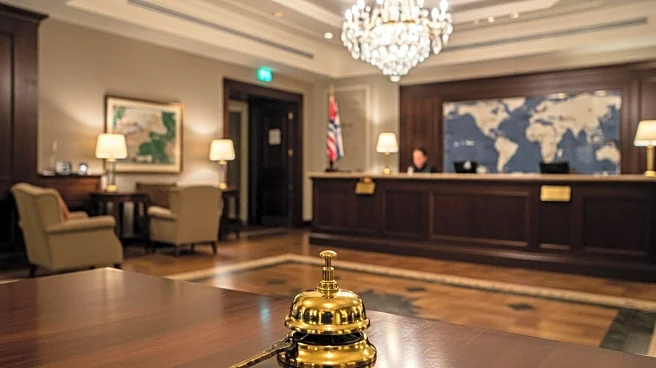What is the story about?
What's Happening?
The U.S. hotel industry is experiencing a decline in revenue per available room (RevPAR) for the week ending August 9, 2025, with a decrease of 1.6% due to reduced occupancy and average daily rate (ADR). This downturn is influenced by challenging market conditions in key regions and comparisons to last year's Hurricane Debby, which created favorable conditions in some Southeast markets. Globally, RevPAR growth continues, although it is impacted by comparisons to last year's Paris Summer Olympics. The U.S. market performance shows a 0.7 percentage point drop in occupancy and a 0.6% decrease in ADR, with significant declines in markets like Houston and Las Vegas. Despite excluding these two markets, the Top 25 Markets still experienced a 2.5% decrease in RevPAR.
Why It's Important?
The decline in RevPAR in the U.S. hotel industry highlights ongoing challenges in key markets, affecting profitability and operational strategies. The impact of Hurricane Debby and comparisons to major events like the Paris Summer Olympics underscore the volatility in market performance. Luxury hotels, which have shown consistent gains, are now experiencing a slowdown, indicating potential shifts in consumer behavior and spending patterns. The broader significance lies in the pressure on profit margins due to rising inflation and operational expenses, which are outpacing room revenue growth. This situation could lead to strategic adjustments in pricing, marketing, and service offerings to maintain competitiveness.
What's Next?
As the summer season concludes, the U.S. hotel industry will closely monitor the fall conference and meeting season, which follows a lackluster summer for group performance. The industry faces ongoing RevPAR deficits, particularly in the Top 25 Markets, even after accounting for atypical comparisons such as storm impacts. Globally, RevPAR growth remains positive, excluding France, and does not appear to be at risk of turning negative in the near future. Industry stakeholders may need to adapt to changing consumer preferences and economic conditions to sustain growth.
Beyond the Headlines
The decline in RevPAR and the challenges faced by the U.S. hotel industry may have deeper implications for employment and investment in the sector. As hotels navigate these economic pressures, there could be shifts in workforce dynamics, with potential impacts on job security and wage growth. Additionally, the reliance on favorable comparisons to past events highlights the need for sustainable growth strategies that are less dependent on external factors.
















